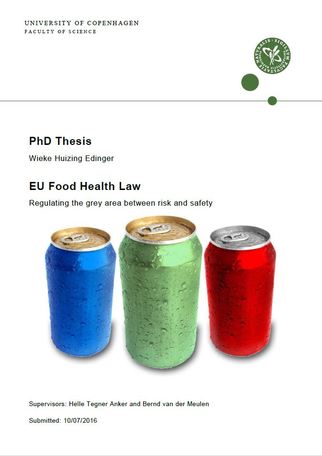|
In 2016 Wieke Huizing Edinger at the University of Copenhagen defended her PhD thesis 'EU Food Health Law. Regulating the grey area between risk and safety'. The thesis was co-supervised by Helle Tegner Anker (University of Copenhagen) and myself.
This thesis shows that the distinction between food safety and non-safety issues in Regulation (EC) No 178/2002, the General Food Law (GFL), results in a grey area of regulation. This grey area comprises foods that do not pose a food safety risk in a legal sense, but that could pose a threat to human health because of other factors, such as their nutritional composition. The growing prevalence of obesity and non-communicable diseases are health challenges that are difficult to fit into the concept of food safety risks in the GFL. The conclusion is that EU food law does not address the grey area directly. Whereas the responsibility for the prevention or mitigation of food safety risks rests, in principle, with food operators, the main responsibility for the avoidance of non-safety health threats is placed with consumers, who are expected to make informed and rational dietary choices on the basis of the food information provided on food labels or generally available in society. The EU legislative shows increased commitment to further empower consumers in pace with the advancement of modern manufacturing and advertising techniques. This development, however, does not indicate a departure from the average consumer as a protective benchmark in EU food information legislation. On the contrary, the reinforcement of food information legislation as the main tool for consumer protection from non-safety health risks from food reaffirms the assumption that consumers are capable of protecting their own health and well-being, provided they have access to a minimum amount of food information. The EU Treaty does not provide an explicit legal basis for establishing food health legislation, but there appears to be ample room for the adoption of harmonising measures that could facilitate improved consumer protection from non-safety health risks. The EU legislature should use this competence to fill in the regulatory grey area. Two possible ways forward to better integrate food health into the EU food law framework are the broadening of the scope of risk in the GFL and the further adjustment of food information legislation to ensure proper consumer understanding of non-safety health risks from food. | ||||||

